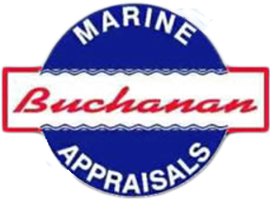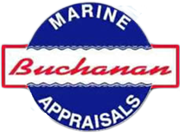Terms and Conditions
Buchanan Marine Appraisal Services Limited assigns R.F. David Buchanan, Accredited Marine
Surveyor #505, OR J.L. Cameron Buchanan, Surveyor Associate, so designated by the Society of Accredited Marine Surveyors (SAMS), to perform the survey on the vessel; The above named client, if not the owner of the subject vessel, represents and
warrants that he/she/they has/have obtained specific authorization from the legal owner of the vessel
for the survey to be carried out;
It is understood that no portion of the vessel will be examined that requires removal of structures,
parts or equipment. No engines or machinery will be disassembled for evaluation. No test borings
of the hull or superstructure will be made, nor will any machinery or equipment be operated. Only
readily accessible and areas cleared of stowage items will be inspected. The above named client
fully understands the potential for errors and inaccuracies resulting from the inability to evaluate
portions of the vessel due to these as well as any other limitation of inspection. For a better
understanding of the survey process, refer to the attached “Scope of Survey”;
The above named client assumes responsibility for any damage inadvertently done to the vessel
during the course of the survey inspection;
The above named client is responsible for making any and all arrangements for hauling and/or
launching the vessel to facilitate the survey and is solely responsible for all associated
marina/boatyard costs;
The surveyor will endeavor to exercise his best judgment and to follow accepted professional
standards and practices in the performance of the survey. Buchanan Marine Appraisal Services
Limited will provide a detailed report describing the condition of the vessel, as observed by the
attending surveyor within a reasonable time frame, depending upon the current office workload. All
efforts are made to get survey reports out within ten working days from the date of inspection. A
verbal consultation will be carried out upon completion of pre-purchase inspections. The survey
report will not express or imply warranty, or guarantee of the condition of the vessel. It is only the
opinion of the surveyor based on his limited visual inspection and tests performed. Buchanan
Marine Appraisal Services Limited nor its surveyors shall, under any circumstances whatsoever, be
held responsible for errors in judgment, or for any inaccuracy, omission or misstatement that may
result from any identified or unidentified limitations of inspection.
The above named client agrees to pay the fee for the cost of the survey, plus any travel expenses and HST.
A Visa or MasterCard account number along with valid expiration date and name of
the cardholder is to be provided to Buchanan Marine Appraisal Services Limited at the time of
booking. The fee will be processed to the credit card upon completion of the on-site inspection.
The fee does not include any boatyard costs, which are the sole responsibility of the above named
client. Alternative methods of payment may be acceptable by prior arrangement, however, the
above named client understands that no survey findings will be discussed or forwarded until all fees
are paid in full.
It is understood that the above named client has reviewed the design and construction of the boat,
and has determined its suitability for his/her intended purposes, and is familiar with the boat’s
cosmetic condition. The surveyor makes no determination of seaworthiness, or evaluation of
stability and handling characteristics.
Independent of the primary survey, Buchanan Marine Appraisal Services Limited recommends that
the above named client consider contracting the services of qualified specialists to carry out expert
inspections of rigging, sails, machinery and electrical systems. The above named Client understands
that the cost of such inspections is not included as part of the primary survey.
By filling out the above form and submitting, you agree and consent to the above terms and
conditions. I have read and understand the terms of the service agreement. I have obtained specific
permission from the legal owner of the subject vessel, or his agent, for the purpose of conducting a
marine survey at the location noted above. I hereby authorize Buchanan Marine Appraisal Services
Limited to process survey fees in the amount of to the credit card account provided above. I
understand that Buchanan Marine Appraisal Services Limited will retain personal information on file
for the sole purpose of future contact, unless I provide a request in writing to the contrary. Survey
reports remain the property of Buchanan Marine Appraisal Services Limited and are retained
indefinitely for the purpose of carrying on normal day-to-day business operations. Buchanan Marine
Appraisal Services Limited agrees that reports will not be forwarded to any third party without my
express written consent.
SCOPE OF SURVEY
The purpose of a marine survey inspection is to determine, insofar as possible within the
limitations of visual and physical accessibility, through non-invasive and non-destructive means,
the subject boat’s structure, systems, cosmetics, and levels of compliance with currently applicable
federal law and commonly accepted industry standards and practices.
Certain parts of the boat’s structure, systems and equipment can only be inspected after removing
flats, bulkheads, joinery, headliners, tanks, etc. This would be prohibitively time consuming,
potentially destructive, and costly to restore. Components requiring access with tools or by
disassembly will not be inspected. Where dirt, marine growth, coatings build-up or corrosion
obscured the surveyor’s ability to inspect, this limitation will be noted in the report. Conditions
suspected or discovered using non-destructive methods may be further subject to invasive testing
for confirmation. No invasive or destructive methods are utilized during the inspection without the
expressed permission of the boat’s owner or owner’s representative.
Complete inspection of machinery, plumbing, electrical systems and available equipment can only
be made by disassembly or by continuous operation. This has not been done, but may be
recommended. No mechanical tests are performed on propulsion or auxiliary generating
equipment. No fluid samples are drawn. Only the installation and external condition of machinery
and accessory equipment is inspected. This should not be considered a complete mechanical
inspection. Qualified marine mechanics experienced with the specific machinery installed should
be employed to survey propulsion engines and auxiliary generators. Propulsion and rudder shafts
are not drawn for inspection, however, this may be recommended. The inspection of flexible
piping is limited to the condition of its external casing and only where readily accessible for visual
inspection.
In the case of sailboats, the boat’s standing rigging is inspected from deck level only. Absent
documentation to the contrary, standing rigging and spars are presumed to be original equipment.
Masts and rigging should be struck periodically for inspection and routine preventive maintenance.
In the case of pre-purchase, or if open water voyaging or extended cruising is planned, a qualified
marine rigger should be employed to go aloft to inspect the rigging.
Electronic and electrical equipment is tested by powering up and observing function. Except as
indicated, no measurements are taken. No calibrations or adjustments are made. Batteries are
not load tested. Only the external condition of electrical wiring, connections and system
installations is inspected. No attempt is made to perform a complete analysis of the boat’s
electrical systems as to do so would require disassembly with tools, removals, etc. to gain access to
components.
Generally it is our experience that few boats surveyed today meet all of the applicable standards
for marine electrical system fabrication and installation. This situation may be further aggravated
by the wet and corrosive marine environment, and often by the owner’s tolerance for poor
installations, “do it yourself” add-ons, and a general lack of preventive maintenance. Therefore,
when the surveyor’s limited visual inspection of an electrical system raises significant concern
regarding standards compliance, the recommendation will be made to employ a qualified marine
electrician for an in-depth inspection. Attention to compliance with electrical standards is critical
electrician for an in-depth inspection. Attention to compliance with electrical standards is critical
to avoiding conditions that may lead to fires, explosions and personal injury or death.
A Sea Trial is not included as part of the survey inspection. If the boat is afloat, operation of
propulsion and auxiliary machinery and the steering system is observed in static mode only in the
presence of the owner or his/her representative. If the boat is blocked ashore, no machinery is
operated. Boats in a state of winter lay-up preclude operation of winterized systems.
Sails, bimini tops, dodgers, awnings, winter covers, etc. are not laid out for inspection. Used sails
are accepted to have conditions of wear and tear normal for their age. Meaningful evaluation of
sails is best made by a qualified Sailmaker laying out sails in a loft.
A boat’s systems and component parts have a limited useful life and must be considered
perishable. Conditions affecting useful life include original material specifications, fabrication and
manufacturing techniques, atmospheric exposures, history of use, etc. These systems and their
component parts often give no readily detectable external indication of deterioration or impending
failure.
Where relevant, the surveyor’s recommendations are based on the Transport Canada TP1332,
Construction standards for Small Vessels, Transport Canada Collision Regulations, as well as
voluntary Standards and Practices for Small Craft, published by the ABYC, and NFPA 302: Standard
for Pleasure and Commercial Motor Craft, published by the National Fire Protection Association.
The foregoing commentary is provided to give readers of this report an understanding of the
survey process and its limitations. Since records of the boat’s history of use and past maintenance
are typically not made available to the surveyor, reported observations are necessarily limited to
the boat’s condition at the time of the inspection was performed.

